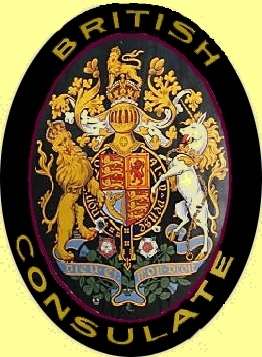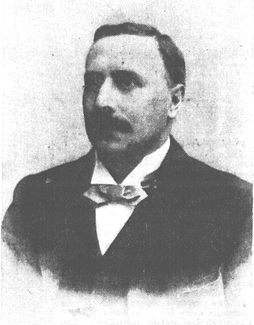|
Alfred Ernest Wileman was appointed His
Majesty's Consul for the Consular District of Tainan, to reside at
Tainan, on 21 May 1903. Consul Wileman took charge of the Tainan
District Consulate on 9 November 1903. Wileman remained the Consul for
the Tainan District until 1 May 1909, when Acting Consul William Massy
Royds took charge.
Alfred
Ernest Wileman was born on 27 February 1860 at Uttoxeter, Staffordshire,
the son of Henry Wileman, a porcelain manufacturer, and his wife
Caroline Jane Brett. Wileman was appointed a Student Interpreter in
Japan on 4 July 1882. Wileman is recorded as acting Second Assistant at
the Hiogo [兵庫] and Osaka [大阪] Consular District in 1886, and was
promoted to be a First Class Assistant on 28 September 1889. In
1891-1892 Wileman was Assistant Japanese Secretary and Acting
Vice-Consul at Tokyo. On 7 June 1892 he was appointed the Acting
Japanese Secretary until 30 October 1894, when he was an Assistant in
the Japanese Secretary’s Office until 31 March 1896. Wileman then served
as the Acting Registrar to the Supreme Court for Japan in Yokohama [横浜]
from 1 April 1896 to 21 February 1897. He was officially promoted to be
the Vice-Consul at Hiogo and Osaka on 28 December 1896, and was several
times Acting Consul there during 1898, residing at Kobe [神戸]. Wileman
was posted as Vice-Consul at Hakodate [函館] on 1 April 1901, before being
promoted to be Consul at Tainan on 21 May 1903.
On 9 November 1903 Consul Alfred Ernest Wileman
took charge of the Consular District of Tainan from Assistant-in-charge
Ernest Alfred Griffiths. Griffiths departed Anping [安平], the port of
Tainan [臺南], on 12 November 1903 for Kobe where he had been appointed to
reside as Vice-Consul for the Consular District of Hiogo and Osaka on 21
May 1903.
As soon as Consul Alfred Ernest Wileman arrived
in the Tainan District he was embroiled in the House Tax issue which had
the British residents at Anping, where Wileman resided, up in arms. All
the British residents at Anping lived on land that they had reclaimed
from the mudflats on the north side of Anping village and the old ruined
Fort Zelandia. As they had reclaimed the land from the sea they held
Chinese Crown leases, and paid a nominal fee in annual property tax. The
Japanese then introduced a House Tax, which contravened, in the eyes of
the British residents, the original undertaking of the Japanese
authorities to respect all existing rights of the foreign community.
They initially paid the House Tax from 1 April 1900 under Protest with
the understanding that the amount paid would be refundable depending on
outcome of Arbitration. The Japanese then declared the Arbitration
Tribunal incompetent and the British residents ceased payment on 30
September 1902, the matter then being referred to a Hague Tribunal. A
decision was not reached until 1912, by which time almost all the
residents and Wileman had departed. Wileman became an expert on the land
rights of British residents in Formosa.
Wileman also reported on the condition of the
Takow Consular Residence, which had been extensively renovated in 1900.
He found the building again infested with white ants and the roof once
again leaking. Since no-one lived there to air the place and take care
of it, Wileman suggested that the plank flooring be replaced with tiles,
the wooden doors, shutters and window frames be replaced by painted iron
ones to withstand the fury of the typhoons on the hill where it stands,
and that the cemented tiles be replaced with patented roofing felt. The
Anping Consulate had a roof of patented roofing felt and was leak-free,
but most British traders had tiled buildings which required to be
cemented every year, mainly due to the frequency of earthquakes, to
remain leak-free.
In 1905 Consul Wileman, who had been suffering
from dysentery for 3 months was advised by Dr James Laidlaw Maxwell, the
Medical Officer attached to the Consulate, to take 2 months’ sick leave.
Allan Weatherhead Bain, who was previously Pro-Consul, was appointed to
the unpaid position of Vice-Consul, and Wileman went on sick leave on 27
November 1905 returning to Anping on 27 February 1906.
During his six years on Formosa Consul Wileman
added considerably to his butterfly and moth collection, visiting and
collecting in many places, including Arizan (Alishan) [阿里山] and Daitozan
[大塔山] above Kagi (Chiayi) [嘉義], and Kotobuki-yama (Shou-shan, Ape’s
Hill) [壽山] beside Takow. Wileman remained the Consul for the Tainan
District until 1 May 1909, when Acting Consul William Massy Royds took
charge and Wileman took 15 months leave.
On 2 November 1909 Consul Alfred Ernest Wileman
was promoted and appointed to be His Majesty's Consul-General for the
Philippine Islands, to reside at Manila. Consul-General Wileman took up
his post in Manila in 1910 and remained there until his retirement on a
pension on 24 October 1914.
During his days in the Japan Consular Service
Wileman had been an avid collector and breeder of butterflies and moths,
and accumulated one of the largest and most comprehensive collections of
Japanese, Formosan and Philippine butterflies and moths ever assembled
by a single individual. Not long after his return from the Philippines,
where he had collected around Baguio, Luzon, Alfred Ernest Wileman
married Mabel Sarah Grundy, the widowed daughter of John Gaskell and
Sarah Goddard, in 1918 at St Martin’s, London. Mabel Sarah Barnes Grundy
was a prolific author of historically-based romantic fiction, publishing
over 25 titles between 1902 and 1946.
Alfred Ernest Wileman died on 15 February 1929
within a few days of his 69th birthday while wintering on the Riviera at
the Riviera Palace Hotel, Menton, France. After his death his widow
Mabel Sarah Wileman donated his collection of butterflies and moths to
the Natural History department of the British Museum, now the Natural
History Museum. Mabel Sarah Wileman died aged 83 at 61 Russian Drive,
Stoneycroft, Liverpool, on 16 January 1952.
|
|
Sources: |
The National Archives, British
Foreign Office Files, series FO
262 (Japan).
Oakley, David Charles; The Story of
the British Consulate at Takow; Privately published,
Kaohsiung, Taiwan, 2007.
Ruxton, Ian; The
Semi-Official Letters of British Envoy Sir Ernest Satow from
Japan and China (1895-1906); and, Correspondence of Sir
Ernest Satow while he was British Minister in Japan
(1895-1900); Lulu Press.
Who's Who in the Far East, 1906-07 June Edition, China Mail,
Hong Kong, 1907. TINEA,
December 1955; The Entomologist, 62, 1929; Proceedings
of the Royal Entomological Society of London, 4, 1930. |
|

